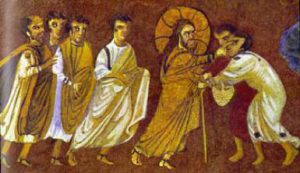
Embarrassed by stories like this? (Jesus healing two blind men, Matthew 9:27-31, Folio 29 of Sinope Gospels)
Blessed are the peacemakers, for they will be called children of God (Matthew 5:9).
How do you take stories of Jesus spitting on dirt, wiping it in a blind man’s eyes, and restoring his sight? Or clearing a leper’s skin with a touch? How about resuscitating a dead daughter after walking home with her dad?
Do these tales embarrass you? Do they make Jesus look like a snake oil salesman or a Marvel comic book character?
Perhaps they reflect a mythical way ancient people expressed awe at wonder-workers. Or they offer insights into healing to which modern naturalism blinds us. Perhaps the cures happened just as the stories say. I don’t know.
But something remarkable happened, something the experience of which changed the witnesses forever. Why do I believe that? Because I experience my emergence from despair to hope as such a miracle. If it happens to me now, of course it happened to others back then, whatever proportions of fact and fiction the gospel stories hold.
My healing change involved a change of mind: I came to take seriously that despite the call to take up my cross and follow, God tirelessly pursues my wholeness and joy. God allows my suffering, but works through it for joy.
That required letting go of the proud assumption that mine should be a heroic narrative and not a healing one. It seemed fine for others to accept a free gift, but I shouldn’t owe anyone, not even God. Grace touched me just before I let go of that pride, whispering in my ear, “It’s okay. You can unclench your fist and receive.”
Gospel healing stories open my eyes to see and ears to hear God’s grace at work. They offer reliable guidance to wholeness in ordinary life. Jesus taught wholeness as he made others whole.
For example, he healed a centurion’s servant after the officer confessed faith that God is in charge, not him (Luke 7:1-10). He trusted in a God who moves and shakes things more than any Caesar.
Moreover, Jesus’ miracle pointed beyond the individual to community well-being. He broke down social barriers. A Jewish rabbi’s healing in a Roman household displayed God’s grace extending to enemies.
Shalom, the Hebrew word for peace, includes personal and social wholeness. Peace for the individual and peace for the community are, well, all of a piece. So Jesus did not distinguish inner peace from social justice. He crossed lines with divine power for both at once.
Buddhist compassion meditation has remarkable stress reducing power. Such meditation involves imagining someone you love, a neutral person, yourself, an enemy, and a specific group of people. You make yourself aware that in some way they suffer, and you send them well-wishes for wellness, happiness, and peace. If imaginatively directing compassion to self and others brings inner peace, consider what really living compassionately can do.
Read gospel healing stories as our Jewish teacher combining Buddhist-like insight with the power of the Holy Spirit to make shalom. You will be embarrassed no more. Or you will be embarrassed anew to realize that the healing stories that seemed not about you were about you all along.
For reflection and comment: What healing stories in scripture or your experience make the most difference for your faith? Why?

0 Comments